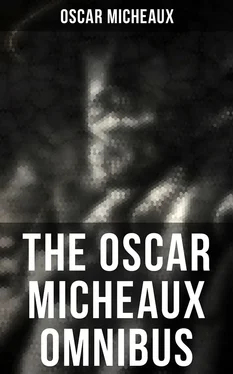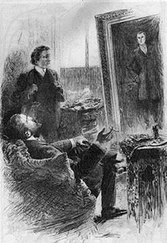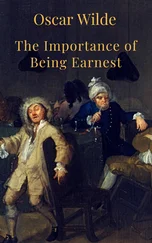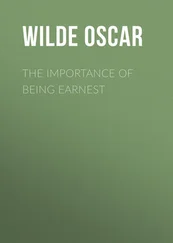While working in the rain, the perspiration and the rain water had caused my body to become so badly galled, that I found considerable difficulty in getting around. To add to this discomfiture Jenny Mule was affected with a touch of "Maudism" at times, especially while engaged in eating grain. One night when I had wandered thoughtlessly into the barn, she gave me such a wallop on the right shin as to impair that member until I could hardly walk without something to hold to. As it had taken a fourteen-hundred-mile walk to follow the plow in breaking the one hundred and twenty acres, I was about "all in" physically when it was done.
As a means of recuperation I took a trip to Chicago. While there, the "call of the road" affected me; I got reinstated and ran a couple of months to the coast. Four months of free life on the plains, however, had changed me. After one trip I came in and found a letter from Jessie, saying she was sick, and although she never said "come and see me" I took it as an excuse and quit that P——n Company for good—and here it passes out of the story—went down state to M—boro, and spent the happiest week of my life.
After I had returned to Dakota, however, I contracted an imagination that worked me into a state of jealously, concerning an individual who made his home in M—boro, and with whom I suspicioned the object of my heart to be unduly friendly. I say, this is what I suspicioned. There was no particular proof, and I have been inclined to think, in after years, that it was more a case of an over-energetic imagination run amuck. I contended in my mind and in my letters to her as well, that I should not have thought anything of it, if the "man in the case" had a little more promising future, but since his proficiency only earned him the munificent sum of three dollars per week, I continued to fret and fume, until I at last resolved to suspend all communication with her.
Now what I should have done when I reached this stage of imaginary insanity, was to have sent Miss Rooks a ticket, some money, and she would have come to Dakota and married me, and together we would have "lived happy ever after." As I see it now, I was affected with an "idealism." Of course I was not aware of it at the time—no young soul is—until they have learned by bitter experience the folly of "they should not do thus and so", and, of course, there is the old excuse, "good intentions." Somewhere I read that the road to—not St. Peter—is paved with good intentions. The result of my prolific imagination was that I carried out my resolutions, quit writing, and emotionally lived rather unhappily thereafter, for some time at least.
CHAPTER XIV
THE SURVEYORS
Table of Contents
The entire Little Crow reservation consisted of about two million acres of land, four-fifths of which was unopened and lay west of Megory County. Of the two million acres, perhaps one million, five hundred thousand ranged from fair to the richest of loam soil, underlaid with clay. The climatic condition is such that all kinds of crops grown in the central west, can be grown here. Two hundred miles north, corn will not mature; two hundred miles south, spring wheat is not grown; two hundred west, the altitude is too high to insure sufficient rainfall to produce a crop; but the reservation lands are in such a position that winter wheat, spring wheat, oats, rye, corn, flax, and barley do well. Ever since the drouth of '94, all crops had thrived, the rainfall being abundant, and continuing so during the first year of settlement. Oristown and other towns on the route of the railroad had waited twenty years for the extension, and now the citizens of Oristown estimated it would be at least ten years before it extended its line through the reservation; while the settlers, to the number of some eight thousand, hoped they would get the road in five years. However, no sleep was lost in anticipation. The nearest the reservation came to getting a railroad that summer was by the way of a newspaper in Megory, whose editor spent most of his time building roads into Megory from the north, south, and the east. In reality, the C. & R.W. was the only road likely to run to the reservation, and all the towns depended on its extension to overcome the long, burdensome freighting with teams.
With all the country's local advantages, its geographical location was such as to exclude roads from all directions except the one taken by the C. & R.W. To the south lay nine million acres of worthless sand hills, through which it would require an enormous sum of money to build a road. Even then there would be miles of track which would practically pay no interest on the investment. At that time there was no railroad extending the full length of the state from east to west, most lines stopping at or near the Missouri River. Since then two or three lines have been built into the western part of the state; but they experienced much difficulty in crossing the river, owing to the soft bottom, which in many places would not support a modern steel bridge. For from one to two months in the spring, floating ice gives a great deal of trouble and wreaks disaster to the pontoon.
A bird's eye view of the Little Crow shows it to look something like a bottle, the neck being the Missouri River, with the C. & R.W. tracks creeping along its west bank. This is the only feasible route to the Reservation and the directors of this road were fully aware of their advantageous position. The freight rates from Omaha to Oristown (a distance of two hundred and fifty miles) being as high as from Omaha to Chicago, a distance of five hundred miles.
But getting back to the settlers around and in the little towns on the Little Crow. The first thing to be considered in the extension was, that the route it took would naturally determine the future of the towns. Hedrick, Kirk, and Megory were government townsites, strung in a northwesterly direction across the country, ranging from eight to fifteen miles apart, the last being about five miles and a half east of the west line of the county. Now the county on the west was expected to be thrown open to settlement soon, would likely be opened under the lottery system, as was Megory county. After matters had settled this began to be discussed, particularly by the citizens of Megory, five and one-half miles from the Tipp County line. This placed Megory in the same position to handle the crowds coming into the next county, as Oristown had for Megory County, excepting Megory would have an advantage, for Tipp County was twice as large as Megory. When this was all considered, the people of Megory began to boost the town on the prospects of a future boom. The only uncertain feature of the matter then to be considered was which way the road would extend. That was where the rub came in, which way would the road go? This became a source of continual worry and speculation on the part of the towns, and the men who felt inclined to put money into the towns in the way of larger, better, and more commodious buildings; but when they were encouraged to do so, there was always the bogy "if." If the railroad should miss us, well, the man owning the big buildings was "stung," that was all, while the man with the shack could load it on two or four wagons, and with a few good horses, land his building in the town the railroad struck or started. This was, and is yet, one of the big reasons shacks are so numerous in a town in a new country, which expects a road but knows not which way it will come; and the officials of the C. & R.W. were no different from the directors of any other road. They were "mum" as dummies. They wouldn't tell whether the road would ever extend or not.
The Oristown citizens claimed it was at one time in the same uncertainty as the towns to the west, and for some fifteen or twenty years it had waited for the road. With the road stopping at Oristown, they argued, it would be fully ten years before it left, and during this time it could be seen, Oristown would grow into an important prairie city, as it should. Everything must be hauled into Oristown, as well as out. So it can be seen that Oristown would naturally boom. While nothing had been raised to the west to ship out, as yet, still there was a growing population on the reservation and thousands of carloads of freight and express were being hauled into and from Oristown monthly, for the settlers on the reservation; which filled the town with railroad men and freighters. Crops had been good, and every thing was going along smoothly for the citizens and property owners of Oristown. Not a cloud on her sky of prosperity, and as the trite saying goes: "Everything was lovely, and the goose hung high," during the first year of settlement on the Little Crow.
Читать дальше












